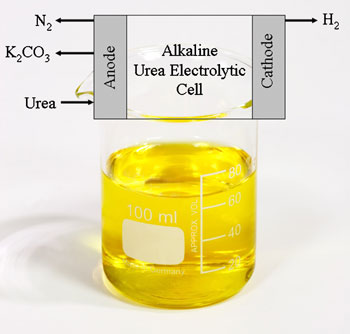Urine: A 'Clean' Energy Source
July 8, 2009 -- Urine-powered cars, homes and personal electronic devices could be available in six months with new technology developed by scientists from Ohio University.
Using a nickel-based electrode, the scientists can create large amounts of cheap hydrogen from urine that could be burned or used in fuel cells. "One cow can provide enough energy to supply hot water for 19 houses," said Gerardine Botte, a professor at Ohio University developing the technology. "Soldiers in the field could carry their own fuel."
Pee power is based on hydrogen, the most common element in the universe but one that has resisted efforts to produce, store, transport and use economically.
Storing pure hydrogen gas requires high pressure and low temperature. New nanomaterials with high surface areas can adsorb hydrogen, but have yet to be produced on a commercial scale.
Chemically binding hydrogen to other elements, like oxygen to create water, makes it easier to store and transport, but releasing the hydrogen when it's needed usually requires financially prohibitive amounts of electricity.
By attaching hydrogen to another element, nitrogen, Botte and her colleagues realized that they can store hydrogen without the exotic environmental conditions, and then release it with less electricity, 0.037 Volts instead of the 1.23 Volts needed for water.
One molecule of urea, a major component of urine, contains four atoms of hydrogen bonded to two atoms of nitrogen. Stick a special nickel electrode into a pool of urine, apply an electrical current, and hydrogen gas is released.
Botte's current prototype measures 3x3x1 inch and can produce up to 500 milliwatts of power. However, Botte and her colleagues are actively trying to commercialize several larger versions of the technology.
A fuel cell, urine-powered vehicle could theoretically travel 90 miles per gallon. A refrigerator-sized unit could produce one kilowatt of energy for about $5,000, although this price is a rough estimate, says Botte.
.
.
.
.
Using a nickel-based electrode, the scientists can create large amounts of cheap hydrogen from urine that could be burned or used in fuel cells. "One cow can provide enough energy to supply hot water for 19 houses," said Gerardine Botte, a professor at Ohio University developing the technology. "Soldiers in the field could carry their own fuel."
Pee power is based on hydrogen, the most common element in the universe but one that has resisted efforts to produce, store, transport and use economically.
Storing pure hydrogen gas requires high pressure and low temperature. New nanomaterials with high surface areas can adsorb hydrogen, but have yet to be produced on a commercial scale.
Chemically binding hydrogen to other elements, like oxygen to create water, makes it easier to store and transport, but releasing the hydrogen when it's needed usually requires financially prohibitive amounts of electricity.
By attaching hydrogen to another element, nitrogen, Botte and her colleagues realized that they can store hydrogen without the exotic environmental conditions, and then release it with less electricity, 0.037 Volts instead of the 1.23 Volts needed for water.
One molecule of urea, a major component of urine, contains four atoms of hydrogen bonded to two atoms of nitrogen. Stick a special nickel electrode into a pool of urine, apply an electrical current, and hydrogen gas is released.
Botte's current prototype measures 3x3x1 inch and can produce up to 500 milliwatts of power. However, Botte and her colleagues are actively trying to commercialize several larger versions of the technology.
A fuel cell, urine-powered vehicle could theoretically travel 90 miles per gallon. A refrigerator-sized unit could produce one kilowatt of energy for about $5,000, although this price is a rough estimate, says Botte.
.
.
.
.


 .
.
Comment